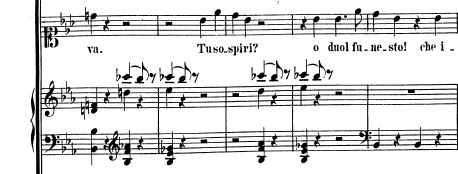Suspensions, Scarlatti – Sonata in G minor
In music, as in real life, the interaction between tension and release is a very important phenomenon. In the mind of the listener it creates a sense of expectation, anticipation and finally release. It makes music move.
It is a an important way for the artist to shape the musical story. A widely used means for this in the harmonic field of music is playing a dissonant, non-chord note in the melody that resolves into a consonant, “right” chord note: tension- release. When the dissonant note is held over from a previous chord it’s called a suspension. If not, an appoggiatura.
In short: I love it. Especially how the “wrong” note dissolves into the present chord “like a cube of sugar into a cup of tea”. In other words: the dissonant is played strongly and the release simply disappears into the sounding accompaniment.
In the sonata in G minor of Domenico Scarlatti I recorded for this post you’ll find many suspensions. ( the suspended note is not held on but repeated at the new chord).
It is almost an educational demonstration of composing with suspensions. A beautiful one, though.
Listen here:
In German it is called a “Seufzer”, a sigh. This naming reflects a highly interesting aspect which fascinates me: a sigh can express different emotions from deeply mourning to high spirited. From reflective moods to exuberant joy. From a psychological point of view very interesting: the same physical expression for such varied, even contrary emotions.
For the performing artist this means multiple possibilities to choose from for a musical interpretation.
In the above recording of Scarlatti I tried to play the suspensions in a moderate, “civilized” manner. Writing this the thought comes to mind it would be nice to play it live for a small public and present several versions with different “moods”, also more extreme ones. And then discuss it. A kind of “Bechstein tapes moods soirée”…… 😉 .
In Mozart’s beautiful concert aria with piano obligate ”Ch’io mi scordi di te” KV 505 the soprano sings “tu sospiri?“ (do you sigh?) with the piano playing suspensions. Breathtaking….
Listen to this passage here (with Joyce DiDonato and Alexandre Tharaud):
Make sure to also listen to the entire piece of music, it is worthwhile. An extraordinary mix of an opera aria and piano concerto.
Getting hold of the sheet music of the Scarlatti sonata was a small adventure. Lying in bed with the flu I heard this beautiful little gem on my clock radio. Later, when trying to track it down on the radio stations website it turned out the sonata had no Kirkpatrick or Longo number. A needle in a haystack to find, Scarlatti wrote hundreds of sonatas. But an employee of a well-known Dutch sheet music store came to rescue: I wrote down the first measures by ear and she went on a search, leafing through the stores books. After a few hours the phone rang: “I’ve got it…”.
or
Mooie uitvoering Paul van deze Scarlatti sonata, ..fantastische muziek !
Bijzonder het gebruik van de piano als orkestinstrument in het stuk van Mozart..
Ik heb enorm genoten van het verhaal achter de muziek, en van de muziek zelve. Beiden vol “suspension”, naar mijn smaak. Goed geschreven en goed gespeeld. Een bekentenis: ik heb een zwak voor Scarlatti heb. In 1992 heb ik een CD van Pogorelich met Scarlatti sonatas gekocht (Deutsche Gram.) en die draai ik nog steeds regelmatig. Een paar weken geleden hoorde ik op radio 4 zondagmiddag opnames van een jonge Franse pianist – Lukas Debargue – van Scalatti. Ook zeer aan te raden. je kan e.e.a. makkelijk vinden via spotify of youtube of zo. Ik ben wel te porren voor… Read more »
Prachtig ingetogen stuk Paul!
Mooi verhaal ook over die bladmuziekzoektocht!
Dank je Paul voor deze heerlijk rustieke bespiegeling op de zondagmorgen !